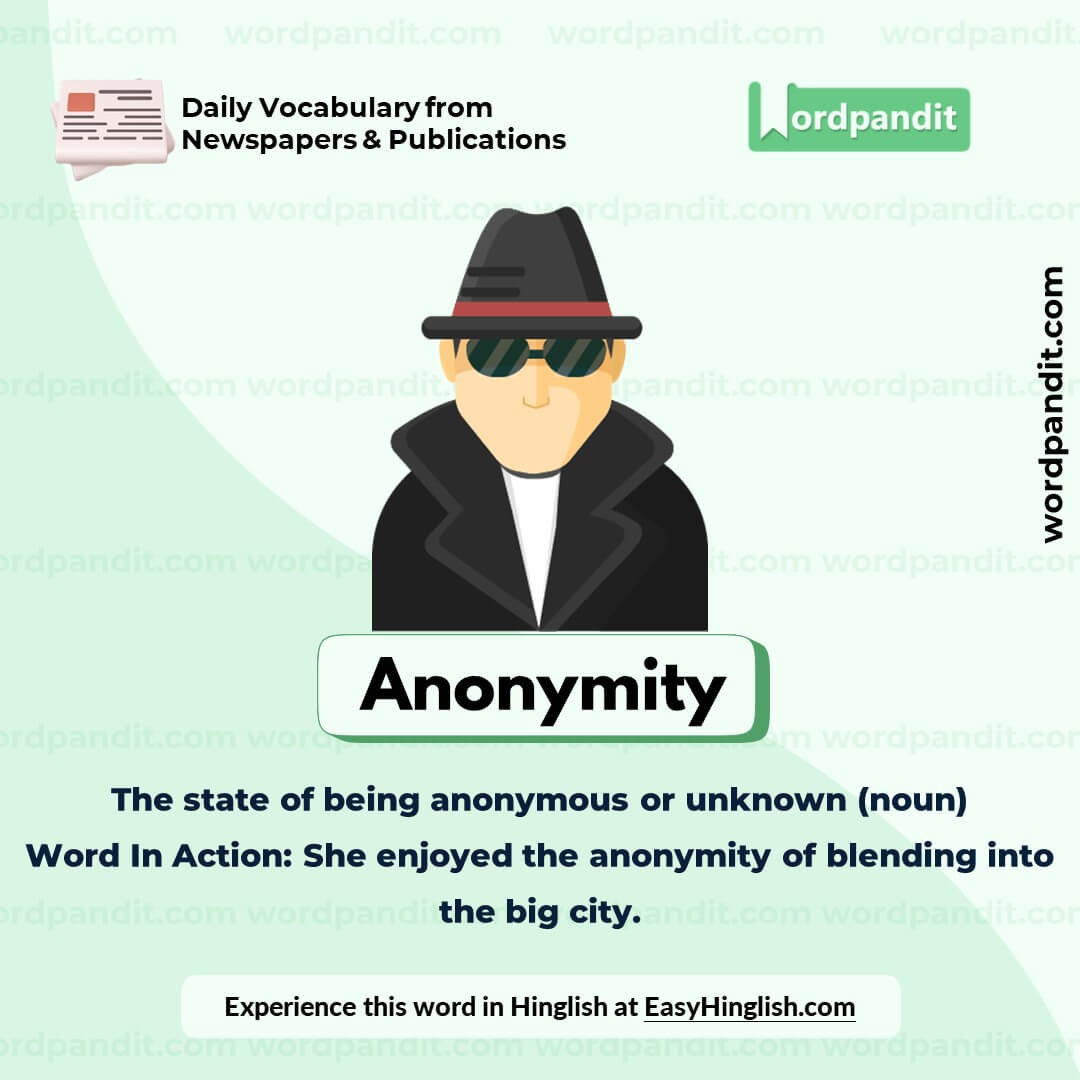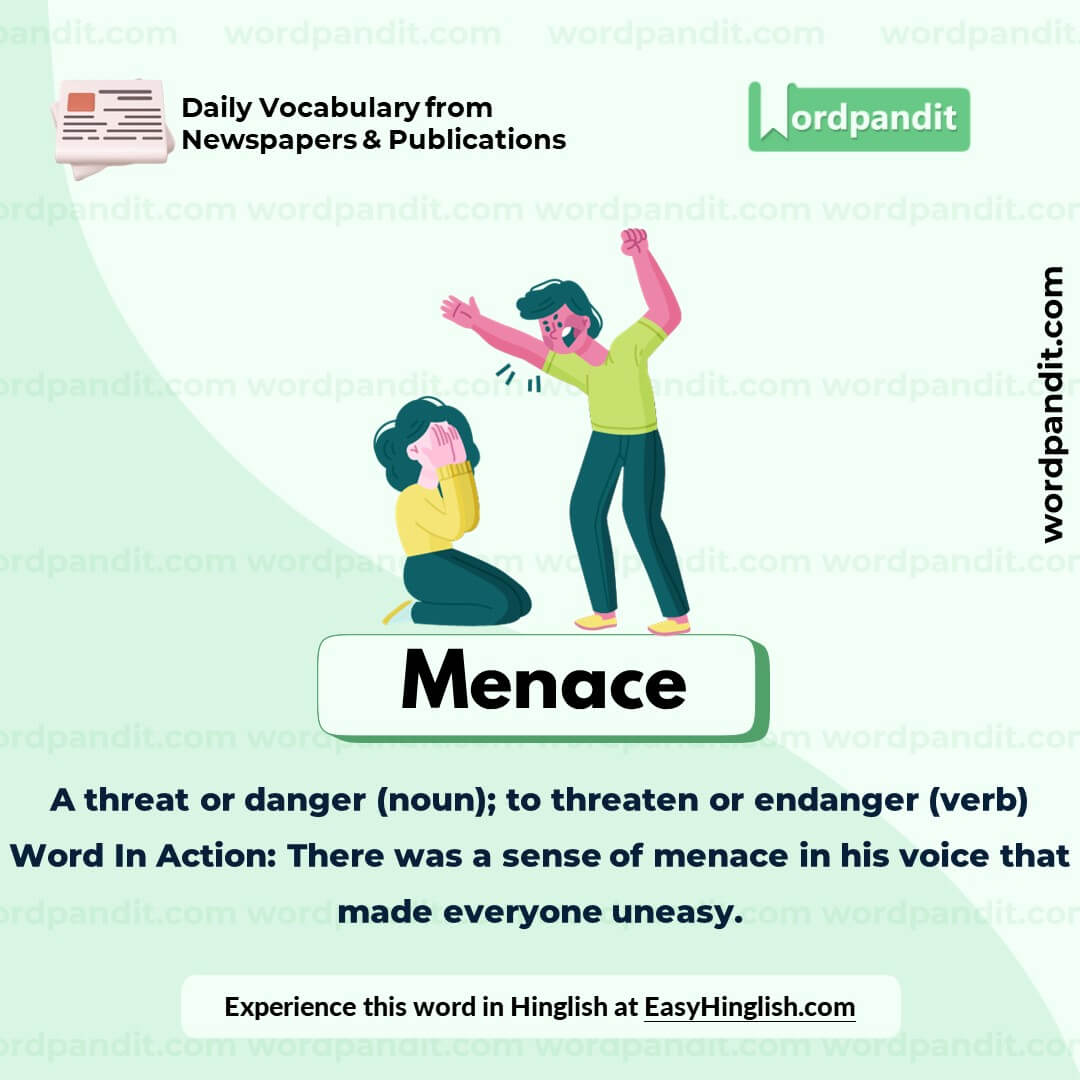Daily Vocabulary from Indian Newspapers and Publications
Welcome to Wordpandit’s Indian Vocabulary Hub
At Wordpandit, we understand the importance of staying rooted in the local context while expanding your language skills. This section focuses on enriching your vocabulary with words and phrases drawn from India’s leading newspapers and publications, ensuring you're learning vocabulary that is practical, relevant, and uniquely Indian.
Why Indian Sources Matter
We believe that the best way to master any language is by immersing yourself in local content. That’s why we carefully curate vocabulary from top Indian publications, including:
- The Hindu
- The Times of India
- The Economic Times
- Hindustan Times
- Live Mint
- The Indian Express
- And many others...
Stay Updated, Stay Relevant
With daily updates from Indian news sources, you’ll be consistently learning words that reflect the trends and shifts in Indian society and culture. Our focus is to provide vocabulary that enhances your understanding of the language in an Indian context.
How Wordpandit Supports Your Goals
Whether you’re preparing for exams, aiming to improve your professional communication, or simply want to stay connected with the latest Indian vocabulary, Wordpandit is here to guide you every step of the way.
Learn with a Practical Approach
Our interactive learning methodology includes real-world examples, engaging activities, and context-specific usage to ensure that every word becomes part of your active vocabulary.
Dive into Indian Vocabulary Today!
Why Choose Wordpandit?
Practical Learning: Focus on words you'll actually encounter in real-world reading, enhancing your comprehension and communication skills.
Diverse Content: From current affairs to scientific breakthroughs, our varied sources expose you to vocabulary across multiple domains.
Effortless Integration: Make Wordpandit a part of your daily routine. Just a few minutes each day can significantly boost your lexicon over time.
Your Path to Vocabulary Mastery
- Visit our Daily Vocabulary section regularly
- Explore new words and their usage in context
- Practice incorporating these words into your own writing and speech
- Track your progress as your vocabulary expands
Start Your Journey Today
Embark on your vocabulary enhancement journey with Wordpandit. By consistently engaging with our daily posts, you'll build a robust vocabulary that serves you well in academic, professional, and personal contexts.
Remember, a word a day keeps linguistic limitations at bay. Make Wordpandit your daily companion in the quest for vocabulary excellence!
WORD-1: Garnering
Context:
"The support that Fadnavis is garnering for the top post seemingly stems from two reasons." - Indian Express
Explanatory Paragraph:
To "garner" something means to gather or collect it, often as a result of effort. It is commonly used to describe the process of accumulating support, resources, or recognition. In this context, "garnering support" suggests actively seeking and earning backing or approval from others.
Meaning: To gather, collect, or acquire, especially through effort (verb)
Pronunciation: GAHR-ner-ing
Difficulty Level: ⭐⭐ (Intermediate)
Etymology: From Middle English garneren, meaning "to store grain," which traces back to the Latin granarium, meaning "granary."
Synonyms & Antonyms:
Synonyms: collect, gather, accumulate, acquire, amass
Antonyms: disperse, distribute, relinquish, lose
Usage Examples:
- She worked hard to garner enough support for her community project.
- The movie garnered critical acclaim for its bold storytelling.
- The politician managed to garner votes across various demographics.
- By offering discounts, the company garnered attention from new customers.
Cultural Reference:
"To garner respect, one must show respect." - An often-referenced saying that emphasizes the reciprocal nature of respect.
Think About It:
What are some of the ways people can garner trust or respect in both personal and professional settings?
Quick Activity:
Think of a recent project or goal you achieved. What steps did you take to garner support or resources?
Memory Tip:
Associate "garner" with "gather" since both involve collecting or amassing something valuable.
Real-World Application:
In business and leadership, "garnering support" is crucial for implementing ideas, policies, or changes. Effective leaders work to gain backing from teams and stakeholders to ensure successful outcomes.
WORD-2: Anonymity
Context:
"At the grassroots level, the sentiment within the right wing is (Narendra) Modi for the country and Fadnavis for Maharashtra,” the leader said, requesting anonymity." - Indian Express
Explanatory Paragraph:
“Anonymity” refers to the state of being unknown or unidentifiable, where one’s identity is kept hidden or undisclosed. Often, individuals request anonymity when they want to speak freely or share sensitive information without being personally identified.
Meaning: The state of being anonymous or unknown (noun)
Pronunciation: an-uh-NIM-i-tee
Difficulty Level: ⭐⭐ (Intermediate)
Etymology: From Greek anonymos, meaning "without a name"
Synonyms & Antonyms:
Synonyms: obscurity, namelessness, secrecy, invisibility
Antonyms: identity, recognition, fame, acknowledgment
Usage Examples:
- The whistleblower insisted on anonymity to protect their job.
- Many online users prefer anonymity to maintain their privacy.
- For their safety, witnesses were granted anonymity during the trial.
- In a survey, respondents were allowed anonymity to give honest feedback.
Cultural Reference:
“Anonymity is the spiritual foundation of all our traditions, ever reminding us to place principles before personalities.” - From the Twelve Traditions of Alcoholics Anonymous
Think About It:
How might the option of anonymity affect the honesty and openness of people’s opinions in public discussions?
Quick Activity:
Think of a time when you might have wanted to remain anonymous. Write down why anonymity would be important in that situation.
Memory Tip:
Link “anonymity” to “anonymous” (without a name) to remember that it means staying unrecognized or unnamed.
Real-World Application:
Anonymity is often crucial in journalism, law, and online spaces, where it allows people to share information or opinions without fear of repercussions.
WORD-3: Intimated
Context:
"All customers who were booked on Vistara flights scheduled for or after November 12 have been intimated about the changes in bookings, which have now been moved to Air India." - Indian Express
Explanatory Paragraph:
“Intimated” means to inform or notify someone about something, typically in a formal or subtle manner. In this case, it suggests that Vistara’s customers were officially informed about the changes to their flight bookings.
Meaning: To communicate or make known indirectly (verb)
Pronunciation: IN-ti-mayt-ed
Difficulty Level: ⭐⭐ (Intermediate)
Etymology: From Latin intimare, meaning "to impress or announce"
Synonyms & Antonyms:
Synonyms: informed, notified, communicated, announced
Antonyms: concealed, hid, withheld, kept secret
Usage Examples:
- The manager intimated to the staff that there would be upcoming changes in the work schedule.
- She intimated her feelings through subtle gestures rather than direct words.
- The company intimated its decision to merge with a competitor.
- He intimated that he might be moving to a new city, but didn’t provide details.
Cultural Reference:
In classic literature, characters often "intimate" their intentions indirectly, hinting at plans or emotions without stating them outright, a common storytelling device to build intrigue.
Think About It:
How can intimating information rather than stating it directly affect how the message is received or understood?
Quick Activity:
Think of a recent time when you needed to share news with someone. Did you directly state it, or did you intimate it? Why did you choose that approach?
Memory Tip:
To remember "intimated," think of “intimate information,” as it often involves sharing or hinting something personal or confidential.
Real-World Application:
In professional communication, sometimes managers intimate upcoming changes before officially announcing them, preparing employees for what may come.
WORD-4: Menace
Context:
"Initially, we had asked such students to leave the class, and later we issued a notice to everyone. However, the menace kept spreading.” - Indian Express
Explanatory Paragraph:
“Menace” refers to something or someone that poses a threat or causes harm, trouble, or danger. In this context, it suggests an ongoing problem or disruptive behavior that continued to spread despite warnings and actions taken.
Meaning: A threat or danger (noun); to threaten or endanger (verb)
Pronunciation: MEN-uhs
Difficulty Level: ⭐⭐ (Intermediate)
Etymology: From Latin minacia, meaning "threats" or "threatening"
Synonyms & Antonyms:
Synonyms: threat, danger, hazard, peril, nuisance
Antonyms: safety, protection, aid, blessing, security
Usage Examples:
- The rise in cyberbullying has become a serious menace to young people.
- During the storm, downed power lines posed a menace to the neighborhood.
- Despite warnings, the menace of pollution continues to grow in the city.
- His reckless driving was a menace to everyone on the road.
Cultural Reference:
"Dennis the Menace," a popular comic character, epitomizes the idea of a harmless but mischievous threat who unintentionally causes trouble around him.
Think About It:
What are some ways a community can address a menace before it becomes a larger problem?
Quick Activity:
Think of a common nuisance or minor threat in your community. What steps could be taken to address this menace?
Memory Tip:
Connect “menace” with “menacing,” as both suggest something that causes fear or harm, helping you remember its association with threats or danger.
Real-World Application:
The term "menace" is often used in legal contexts to describe harmful actions, such as "menacing behavior," which can be grounds for legal action to protect public safety.
WORD-5: Intellectuals
Context:
"The school plans to continue its campaign. Its next move is a mega awareness conference where parents, guardians, teachers, local intellectuals, as well as barbers and salon owners will be invited to take part." - Indian Express
Explanatory Paragraph:
“Intellectuals” are individuals who engage in critical thinking, research, and reflection, often contributing to society through ideas and knowledge. They are typically known for their mental engagement in issues and their depth of understanding. Here, "local intellectuals" likely refers to thinkers or educated people in the community who can help enrich the awareness conference.
Meaning: People who engage in serious study, thought, and analysis, often on complex issues (noun)
Pronunciation: in-tuh-LEK-choo-uhls
Difficulty Level: ⭐⭐⭐ (Intermediate)
Etymology: From Latin intellectus, meaning "understanding" or "perception"
Synonyms & Antonyms:
Synonyms: thinkers, scholars, academics, philosophers, experts
Antonyms: laypersons, non-thinkers, ignoramuses
Usage Examples:
- The debate was lively, with intellectuals from various fields contributing their perspectives.
- Intellectuals often play a key role in shaping social policies and educational reforms.
- She admired the intellectuals who led discussions on philosophy and science.
- Many intellectuals advocate for free speech and the exchange of ideas.
Cultural Reference:
The term “intellectual” often brings to mind figures like Albert Einstein, who was not only a scientist but also an intellectual who questioned and shaped ideas about society and ethics.
Think About It:
How do intellectuals influence society, and why is it important for communities to include them in discussions on public issues?
Quick Activity:
Identify an intellectual in your community or a public figure you admire. Write down how their ideas have impacted you or your community.
Memory Tip:
Think of “intellect” in “intellectuals” to remember they’re people who value knowledge and deep thinking.
Real-World Application:
Intellectuals often contribute to public discussions, influencing policy, education, and cultural growth. Their input is valuable in fields like science, ethics, and the arts.















